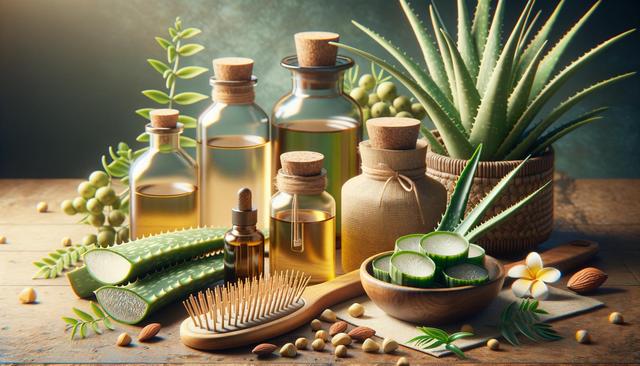
Discover Effective Natural Remedies for Thicker Hair
Understanding the Root Causes of Thinning Hair
Before exploring natural remedies, it’s helpful to understand why hair becomes thin or starts falling out. Hair thinning can result from a combination of genetic, hormonal, and lifestyle factors. Common causes include stress, poor diet, hormonal imbalances, and improper hair care habits. Environmental factors like pollution and exposure to harsh chemicals can also damage hair follicles over time. Knowing the root of the problem can help you choose the most appropriate natural treatments to address it.
One of the most overlooked contributors to hair thinning is chronic stress. High stress levels can disrupt the hair growth cycle, leading to more shedding and slower regrowth. Likewise, nutrient deficiencies—especially in iron, biotin, zinc, and protein—can weaken hair shafts and reduce volume. Hormonal changes, such as those during pregnancy or menopause, may also impact hair thickness. By identifying these triggers, individuals can make informed choices about natural remedies that align with their specific needs.
Boosting Hair Growth with Essential Oils
Essential oils have gained popularity for their potential in supporting scalp health and stimulating hair follicles. Two widely used oils for promoting thicker hair are rosemary and peppermint. These oils are believed to increase circulation to the scalp, which may enhance the delivery of nutrients and oxygen to hair roots.
Here’s how to incorporate essential oils into your routine:
- Mix a few drops of rosemary or peppermint oil with a carrier oil like coconut or jojoba oil.
- Massage the mixture into your scalp for 5–10 minutes, 2–3 times a week.
- Leave it on for at least 30 minutes before washing your hair as usual.
Consistent use of essential oils may improve hair texture and fullness over time. Always conduct a patch test before using any new oil to avoid skin irritation. For added benefit, you can also look for hair care products that contain these natural ingredients.
The Role of Nutrition in Hair Thickness
A well-balanced diet is key to supporting healthy hair from within. Hair is made primarily of protein, specifically a type called keratin. Consuming adequate protein along with vitamins and minerals is essential for strong, thick strands. Foods rich in biotin, vitamin D, omega-3 fatty acids, and iron play a significant role in maintaining hair density.
Some hair-friendly foods include:
- Eggs (rich in biotin and protein)
- Spinach and other leafy greens (high in iron and vitamin C)
- Fatty fish like salmon (packed with omega-3s and vitamin D)
- Nuts and seeds (contain zinc and healthy fats)
Hydration also matters. Drinking enough water daily supports overall health, including the health of your scalp and hair follicles. Avoiding processed foods and excess sugar can further help reduce inflammation and potential hair loss triggers.
Scalp Massage and Herbal Supplements
Scalp massage is a simple, cost-effective method to stimulate hair growth. Regular massage increases blood flow to the scalp, which can potentially improve hair thickness by nourishing hair follicles. You can use your fingertips or a scalp massaging tool, and combine this with essential oils for added benefits.
In addition to massage, herbal supplements are often used in natural hair care. Saw palmetto is one such herb that has been studied for its potential to block DHT, a hormone linked to hair loss. Other herbs like ginseng and horsetail extract are also believed to support hair strength and growth.
Before starting any supplement, it’s wise to consult with a healthcare provider, especially if you are taking medications or have underlying health conditions. While herbal remedies can be helpful, their effects may vary based on individual factors such as age, genetics, and overall health.
Lifestyle Changes and Hair Care Habits
Natural remedies are most effective when combined with supportive lifestyle choices. Reducing stress through techniques like meditation, yoga, or regular physical exercise can positively affect hair health. Chronic stress is a common yet frequently underestimated factor in hair thinning, and managing it can make a noticeable difference.
Proper hair care habits are also essential. Over-washing, excessive heat styling, and harsh chemical treatments can damage hair shafts and lead to breakage. Instead, opt for gentle, sulfate-free shampoos and conditioners. Limit the use of hot tools, and when necessary, use heat protectants. Trimming split ends regularly helps maintain overall hair health and prevents further damage.
Establishing a sleep routine and prioritizing quality rest is another important factor. During sleep, the body repairs and regenerates cells, including those that support hair growth. Aim for 7–9 hours of sleep per night to support overall well-being, including your hair’s vitality.
Conclusion
Exploring natural remedies for thicker hair can be a worthwhile journey, especially for those seeking a holistic approach to hair health. By understanding the causes of hair thinning and incorporating essential oils, nutrient-rich foods, scalp massage, and healthy lifestyle habits, you can support your hair’s natural growth cycle. Keep in mind that results may take time and consistency is key. With patience and care, natural methods can complement your overall hair care routine and contribute to stronger, fuller-looking hair over time.


